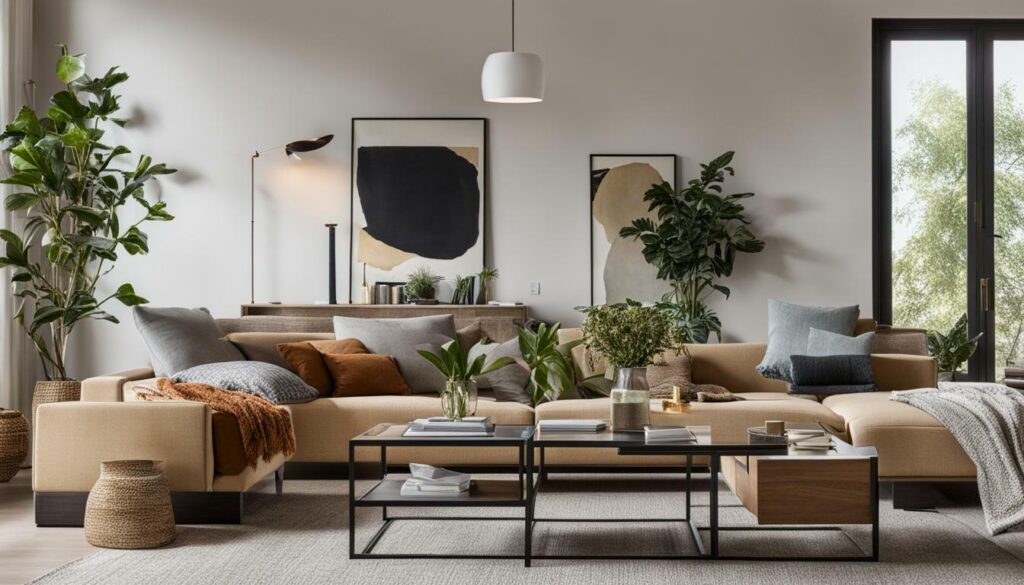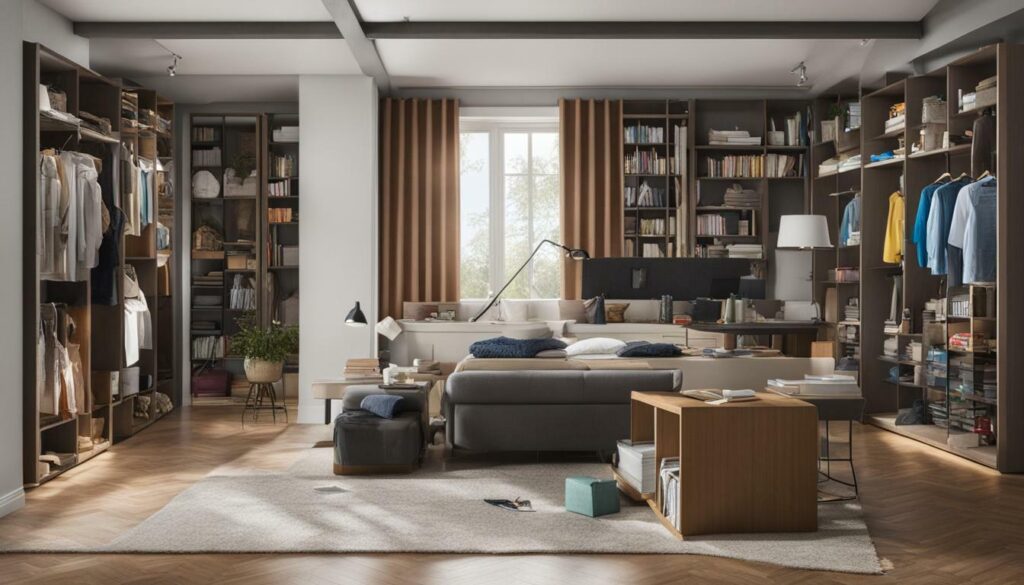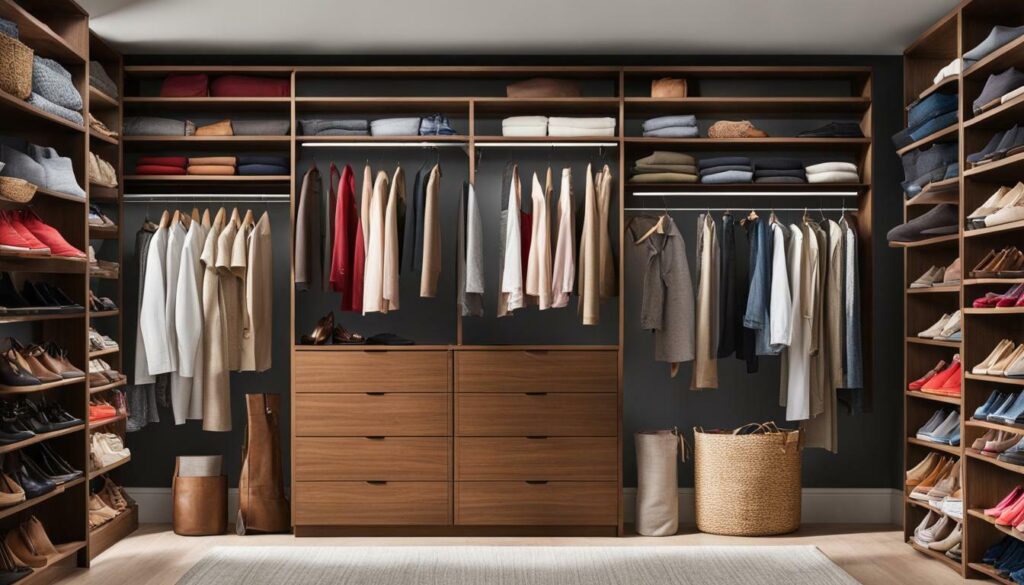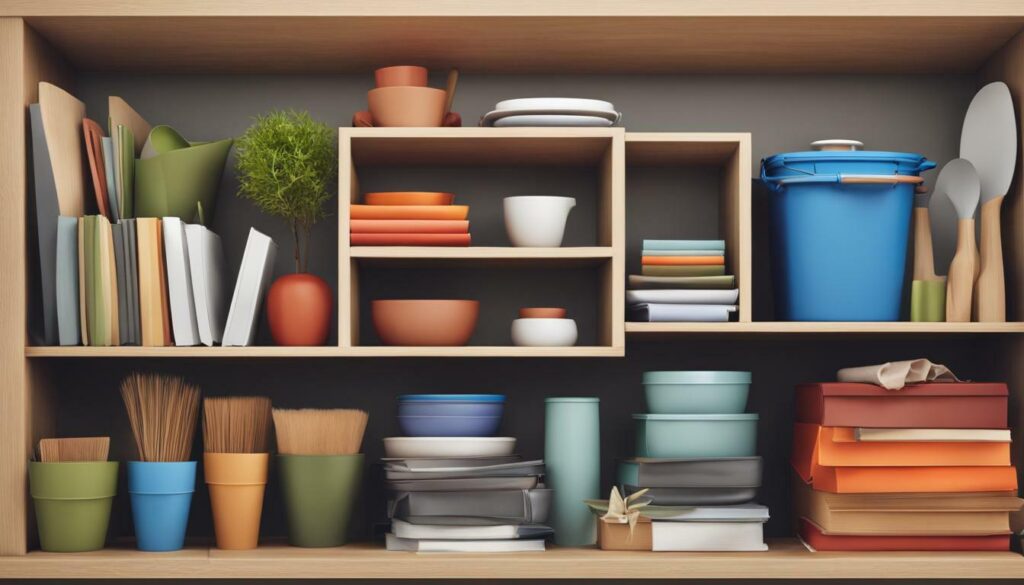Maintaining a well-organized home is essential for a clutter-free and harmonious living environment. When it comes to decluttering and organizing your home, the frequency depends on various factors such as the number of people living in the house, the frequency of shopping, and the number of kids. While a major decluttering session should be done twice a year, it is important to maintain order throughout the year.
Decluttering your home has numerous benefits beyond just aesthetics. It can improve concentration, boost self-esteem, enhance relationships, and even reduce the risk of asthma and allergies. The process of decluttering can be different from cleaning, but it makes the cleaning process much easier and more efficient. By decluttering regularly, you can streamline your cleaning routines and save time and energy.
Getting started with home organization can seem overwhelming, but it doesn’t have to be. One helpful tip is to start with a specific category, such as clothing, and gradually move on to other areas of your home. If you find yourself struggling, don’t hesitate to seek the assistance of a professional organizer who can provide guidance and support.
Instead of simply putting items in storage, it is highly recommended to donate or gift them to charities or local shelters. This not only helps create more storage space in your home, but it also aligns with the principles of minimalism and allows you to give back to the community.
- Regular home organization is important for a clutter-free and harmonious living space.
- Factors such as the number of people in your household and shopping habits influence the frequency of home organization.
- Decluttering has numerous benefits, including improved concentration, increased self-esteem, and reduced asthma and allergy risks.
- Decluttering and cleaning are different but complementary processes. Decluttering makes cleaning easier and more efficient.
- Getting started with home organization can be overwhelming, but starting with a specific category and seeking professional help can make the process easier.
- Instead of storing unused items, consider donating or gifting them to charities or local shelters to create more space and contribute to a larger cause.
Factors to Consider When Determining Home Organization Frequency
The frequency at which you should organize your home depends on several factors that can significantly impact the accumulation of clutter and the effectiveness of your organizational systems. By considering these factors, you can develop a personalized approach to home organization that suits your lifestyle and helps maintain a tidy and stress-free living space.
One important factor to consider is the number of people living in your home. If you have a large family or share living quarters with roommates, the accumulation of clutter can happen more quickly. In such cases, organizing your home more frequently, such as once every three months, may be necessary to keep things in order.
Another factor to take into account is the frequency of shopping. If you tend to bring new items into your home regularly, it’s essential to declutter and reorganize more often. Setting a schedule for decluttering every six months can help you stay on top of any excess belongings and prevent accumulation.
The number of children in your household is also a crucial factor. Kids often have many toys, clothes, and school-related items that can contribute to clutter. To stay organized, consider decluttering their belongings more frequently, such as every three to four months, to ensure that everything has its designated place.
Optimizing your space is another essential consideration when determining home organization frequency. By utilizing smart storage solutions, such as bins, shelves, and hooks, you can maximize the available space and keep your belongings organized. Regularly evaluating your storage solutions and making adjustments as needed can help maintain an orderly and functional living environment.
| Factors to Consider | Recommended Frequency |
|---|---|
| Number of People Living in the Home | Every 3 Months – 6 Months |
| Frequency of Shopping | Every 6 Months |
| Number of Children in the Household | Every 3 Months – 4 Months |
| Space Optimization | As Needed |
By taking these factors into consideration and implementing effective decluttering strategies, you can maintain an organized and clutter-free home. Remember, organizing your home is an ongoing process, and regular maintenance is key to ensuring that your living space remains functional and enjoyable.
The benefits of regular home organization
Regular home organization not only helps to declutter your living spaces but also brings a myriad of benefits that extend beyond a tidy home. Practicing minimalism through decluttering allows you to create a more peaceful and harmonious environment. By reducing the number of unnecessary belongings, you can minimize distractions and improve your concentration. This, in turn, enhances your focus on important tasks and promotes a more productive mindset.
Efficient cleaning routines are another advantage of regular home organization. With fewer items to clean, maintaining a clean and tidy home becomes easier and less time-consuming. You can develop smart storage solutions that maximize space utilization and allow for easier access to essential items. By keeping your home organized, you can streamline your cleaning process and save valuable time and energy.
Regular home organization also contributes to improved mental well-being. A clutter-free environment has been shown to reduce stress levels and increase overall happiness. It promotes a sense of calm and order, allowing you to feel more at ease in your own home. Additionally, decluttering can boost self-esteem by eliminating excess belongings and creating a space that reflects your personal style and values.
Table: The Benefits of Regular Home Organization
| Benefits | Description |
|---|---|
| Promotes minimalism | Creating a clutter-free environment by decluttering unnecessary belongings |
| Optimizes storage solutions | Maximizing space utilization through smart storage solutions |
| Facilitates efficient cleaning routines | Streamlining cleaning processes and saving time and energy |
| Enhances concentration | Reducing distractions and improving focus on important tasks |
| Improves mental well-being | Reducing stress levels, increasing happiness, and promoting a sense of calm |
| Boosts self-esteem | Creating a space that reflects personal style and values |
By embracing regular home organization and enjoying its many benefits, you can create a living space that not only looks great but also enhances your overall well-being.

The Difference between Decluttering and Cleaning
While cleaning focuses on maintaining cleanliness and hygiene, decluttering targets the elimination of unnecessary items to create a more functional and aesthetically pleasing living environment. Decluttering involves sorting through belongings, deciding what to keep, donate, or discard, and organizing the remaining items in an efficient manner.
Decluttering not only enhances the physical appearance of a space but also has numerous benefits for our mental and emotional well-being. By reducing clutter, we can experience improved concentration, increased self-esteem, and decreased stress levels. Additionally, decluttering helps foster better relationships by promoting open communication and creating an inviting atmosphere for guests.
Furthermore, decluttering can have tangible health benefits. Removing excess items from our homes can reduce dust and allergens, minimizing the risk of asthma and allergies. A clutter-free space also facilitates easier cleaning, saving time and energy in our daily routines.
In contrast, cleaning involves the removal of dirt, dust, and germs from surfaces, floors, and other areas of the home. While both cleaning and decluttering contribute to an orderly living space, understanding the distinction between the two is crucial for effective time management and productivity.

By prioritizing decluttering alongside regular cleaning tasks, we can create a more efficient home environment. Allocating time for decluttering sessions and establishing systems for maintaining organization will result in a more streamlined and productive lifestyle.
In summary, decluttering and cleaning are distinct but complementary processes. While cleaning focuses on maintaining cleanliness and hygiene, decluttering targets excess possessions to create a functional and visually appealing space. Incorporating both practices into our routine can lead to improved mental well-being, reduced health risks, and greater overall efficiency in managing our homes.
Getting started with home organization
Embarking on a home organization journey may feel overwhelming, but with the right approach and some helpful tips, you can make steady progress towards a more organized and clutter-free home. By starting with a specific category like clothing, you can break down the task into smaller, more manageable steps.
Here are some organizing tips and decluttering strategies to get you started:
- Sort and categorize: Begin by taking inventory of your clothing and sorting them into categories, such as tops, bottoms, dresses, and accessories. This will help you see what you have and identify any items that you no longer need or want.
- Purge and donate: As you go through each category, make a conscious decision about each item. Ask yourself if it still fits, if you love it, and if it serves a purpose in your current lifestyle. If the answer is no, consider donating or gifting it to someone who could use it.
- Create a system: Once you have decluttered your clothing, it’s time to create an organizational system that works for you. This could involve using storage bins, dividers, or hangers to keep everything in its place. Choose a system that is easy to maintain and fits your personal style.
Remember, getting started is often the hardest part, but taking small steps and keeping a positive mindset will help you achieve your home organization goals. If you find yourself struggling or feeling overwhelmed, don’t hesitate to seek the assistance of a professional organizer who can provide expert guidance tailored to your specific needs.

| Benefits of Home Organization | Decluttering Strategies |
|---|---|
| Improved concentration | Sort and categorize |
| Increased self-esteem | Purge and donate |
| Improved relationships | Create a system |
| Reduced asthma and allergy risks |
The Importance of Decluttering by Category
When it comes to decluttering, adopting a category-based approach can save you time and effort by ensuring that similar items are all addressed together, rather than scattered throughout various rooms. Not only does this method streamline the decluttering process, but it also helps you identify duplicates and determine the true value of each item. By tackling one category at a time, such as clothing, books, or kitchen utensils, you can make more informed decisions about what to keep, donate, or discard.
Organizing items by category also allows you to see the bigger picture and make better use of your available storage space. For example, when decluttering your wardrobe, you may discover that you have an abundance of shoes or a surplus of t-shirts. This realization can help you reassess your purchasing habits and prevent future clutter from accumulating. Plus, organizing similar items together makes it easier to find what you need when you need it, saving you time and frustration in the long run.
By decluttering and organizing your home by category, you can create a more harmonious living space. Clearing out unnecessary belongings not only improves the visual appeal of your surroundings, but it also promotes a sense of calm and reduces mental clutter. Research has shown that an organized environment can enhance concentration and productivity while reducing feelings of stress and anxiety.

It’s important to note that decluttering by category doesn’t mean you have to tackle everything all at once. Breaking down the process into manageable tasks, such as decluttering one category per week or dedicating a specific amount of time each day, can make the process less overwhelming. Additionally, if you find yourself struggling to make decisions or experiencing emotional attachment to certain items, seeking the assistance of a professional organizer can provide guidance and support.
| Benefits of Decluttering by Category |
|---|
| Streamlines the decluttering process |
| Helps identify duplicates and excess items |
| Optimizes storage space |
| Promotes a sense of calm and reduces mental clutter |
| Enhances concentration and productivity |
| Reduces feelings of stress and anxiety |
Remember, decluttering by category is an ongoing process. After the initial organization, regular maintenance is key to prevent clutter from building up again. Make it a habit to regularly reassess each category, discarding items that are no longer needed or loved. By adopting a category-based approach to decluttering, you can create an organized and inviting home that reflects your true priorities.
The Impact of Donating and Gifting Items
Instead of keeping unused items in storage, consider donating or gifting them to create a more spacious and clutter-free living environment while making a positive impact on those in need. By letting go of items that no longer serve a purpose in your life, you not only free up valuable storage space but also contribute to a more minimalist lifestyle.
Donating or gifting items aligns with the principles of minimalism, which encourages individuals to live with less and focus on what truly brings them joy and fulfillment. When you donate or gift your belongings to charitable organizations or local shelters, you are not only helping those who are less fortunate, but you are also reducing waste and promoting sustainability.
Additionally, donating or gifting items can have a profound effect on your own well-being. Letting go of unnecessary possessions can lead to a sense of liberation, clarity, and peace of mind. It allows you to create a harmonious living space that is free from clutter, making it easier to find and appreciate the things that truly matter to you.
| Benefits of Donating and Gifting Items |
|---|
| 1. Creates a clutter-free and spacious living environment |
| 2. Contributes to a more minimalist lifestyle |
| 3. Supports charitable organizations and local shelters |
| 4. Promotes sustainability and reduces waste |
| 5. Enhances your well-being and peace of mind |
So, the next time you feel overwhelmed with unused items taking up valuable space in your home, consider the impact of donating or gifting them. Embrace the opportunity to create a more organized and clutter-free living environment while making a difference in the lives of others.

To prevent your home from becoming overwhelmed with clutter, it is generally advised to undertake major decluttering sessions at least twice a year. These sessions provide an opportunity to thoroughly assess the belongings in your home and make decisions about what to keep, donate, or discard. By dedicating time to decluttering on a regular basis, you can maintain order and prevent the accumulation of excess items.
During these major decluttering sessions, it is important to approach each category of belongings systematically. Start with one category, such as clothing, and gather all items within that category in one place. This allows you to see the full extent of what you own and make more informed decisions about what to keep and what to let go. Remember, decluttering by category rather than by room can help prevent the need for repetitive organization and ensure more efficient and lasting results.
As you declutter, consider the impact of donating or gifting items instead of simply putting them in storage. By sharing unwanted items with charitable organizations or local shelters, you not only create more storage space in your home but also contribute to minimalism principles and support those in need. Plus, knowing your items are going to a good cause can bring a sense of joy and fulfillment.
By following the recommended frequency for major decluttering sessions and adopting decluttering strategies, you can create a clutter-free and harmonious living space. Remember to approach each session with a systematic mindset, declutter by category, and consider the impact of donating or gifting items. With these practices in place, you can enjoy a more organized and stress-free home.
| Benefits of Major Decluttering Sessions | |
|---|---|
| Improved concentration | By removing excess items, you create a more focused and productive environment. |
| Increased self-esteem | A clutter-free space can boost your confidence and provide a sense of accomplishment. |
| Improved relationships | By decluttering, you create a more inviting and welcoming space for family and friends. |
| Reduced asthma and allergy risks | Decluttering helps eliminate dust, allergens, and potential asthma triggers. |

“Decluttering my home completely transformed my life. I used to feel overwhelmed and stressed, but now I have a sense of calm and clarity. The major decluttering sessions I do twice a year have made a huge difference. I highly recommend it!” – Jane Doe
Conclusion
By establishing a consistent home organization routine and considering the factors that influence its frequency, you can ensure that your living spaces remain tidy, functional, and conducive to a balanced lifestyle.
When it comes to decluttering and organizing your home, it’s important to take into account the number of people living in the house, the frequency of shopping, and the number of kids. While a major decluttering session should be done twice a year to maintain order, it’s equally important to maintain a clutter-free environment throughout the year.
Decluttering by category, rather than by room, can save you time and prevent the need to repeat the process. Not only does decluttering have practical benefits, such as making cleaning easier, but it can also have a positive impact on your mental and emotional well-being. By reducing visual distractions, decluttering can improve concentration, increase self-esteem, and even enhance relationships.
When starting your decluttering journey, it can be helpful to begin with a specific category, like clothing. This allows you to focus your efforts and see immediate progress. Additionally, seeking the assistance of a professional organizer can provide valuable guidance and support throughout the process.
Instead of storing unused items, consider donating or gifting them to charitable organizations or local shelters. This not only promotes minimalism and creates more storage space but also helps those in need. By taking these steps, you can create a harmonious living space that promotes a balanced and clutter-free lifestyle.






